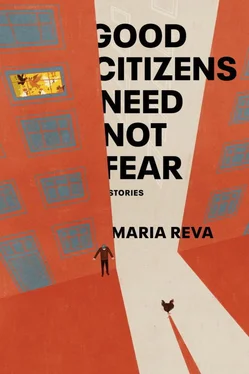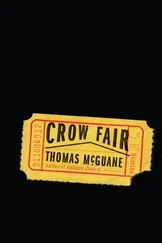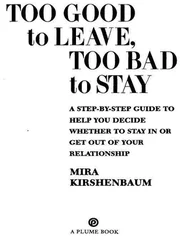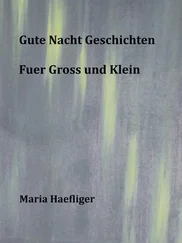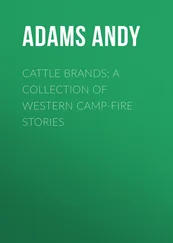Maria Reva - Good Citizens Need Not Fear - Stories
Здесь есть возможность читать онлайн «Maria Reva - Good Citizens Need Not Fear - Stories» весь текст электронной книги совершенно бесплатно (целиком полную версию без сокращений). В некоторых случаях можно слушать аудио, скачать через торрент в формате fb2 и присутствует краткое содержание. Город: New York, Год выпуска: 2020, ISBN: 2020, Издательство: Doubleday, Жанр: Современная проза, humor_satire, на английском языке. Описание произведения, (предисловие) а так же отзывы посетителей доступны на портале библиотеки ЛибКат.
- Название:Good Citizens Need Not Fear: Stories
- Автор:
- Издательство:Doubleday
- Жанр:
- Год:2020
- Город:New York
- ISBN:978-0-38554-529-7
- Рейтинг книги:3 / 5. Голосов: 1
-
Избранное:Добавить в избранное
- Отзывы:
-
Ваша оценка:
- 60
- 1
- 2
- 3
- 4
- 5
Good Citizens Need Not Fear: Stories: краткое содержание, описание и аннотация
Предлагаем к чтению аннотацию, описание, краткое содержание или предисловие (зависит от того, что написал сам автор книги «Good Citizens Need Not Fear: Stories»). Если вы не нашли необходимую информацию о книге — напишите в комментариях, мы постараемся отыскать её.
Good Citizens Need Not Fear: Stories — читать онлайн бесплатно полную книгу (весь текст) целиком
Ниже представлен текст книги, разбитый по страницам. Система сохранения места последней прочитанной страницы, позволяет с удобством читать онлайн бесплатно книгу «Good Citizens Need Not Fear: Stories», без необходимости каждый раз заново искать на чём Вы остановились. Поставьте закладку, и сможете в любой момент перейти на страницу, на которой закончили чтение.
Интервал:
Закладка:
Zaya glares at the clients, suddenly enraged.
She spots a rusty shovel leaning against the wall of the monastery, and uses it to fling a fist-size clod of dirt into the pit. It explodes against the socialite’s knee. Almaza and the clients squeal in mock horror.
Next comes an entire shovelful. The venture capitalist receives the earth spilling over his bald head with rapture, as if it were holy water.
The lifestyle manager moans with pleasure. “I vow to quit my job, take up painting again.”
The steel magnate shouts above them all, “I vow to get my wife and kids back.”
The earth grows soft, welcoming Zaya’s shovel. There’s a rhythm to the slicing, the earth landing with a soft thud. She finds herself counting each stroke. Now the squeals of the clients are turning into screams, but she doesn’t stop, doesn’t break the rhythm. Her anger has ebbed, and is replaced by a logistical curiosity, cold and foreign: How many strokes to fill the pit? She stabs at a weedy ledge and the entire thing comes away, triggers a slide of earth and rocks. The clients try to scramble to their feet but are knocked back down. When the slide settles, they are buried to the chest. Zaya lifts the shovel again; her need to restart the rhythm, the pulse, is dire, desperate—as though her own heart has stopped. Five dirty tear-streaked faces tilt up in a childlike stupor. For a moment Zaya wonders whether they are looking not at her but at some wrathful deity behind her, capable only of destroying.
And yet Almaza says, “Oh, Zaya.” Her voice is awed, naked, and she breaks into a smile. “Couldn’t have planned it better myself.”
“The adrenaline,” whispers the steel magnate.
“We’ll spruce up these graves,” Almaza declares, slowly at first. “We’ll make a maze of the tunnels, for more clients. We’ll fix up your room, have you live here like you own the place.” Almaza wrenches her arms from the dirt, shakes out her ponytail. “Technically you already own it. I bought the internat in your name.”
Zaya feels dizzy, as though sun-stricken . “You did not.”
“Did so. As a foreigner I’d have to pay an extra tax.”
The shovel in Zaya’s hands feels unbearably heavy. Does it, too, belong to her?
Apparently, wreaking terror is all Zaya is good for. Had she forgotten? She thinks of the boot maker again. After the hut had burned down and the woman had delivered Zaya back to the orphanage—this same woman who had found her on the forest floor, gasping for breath, with yellowed eyes and a slit lip that made Zaya look, the woman told her, like a fish dragged from the sea until the hook dislodged; this same woman who had carried Zaya in her arms and nursed her back to health—the abandonment hadn’t hurt. Zaya had felt numb. She hadn’t let herself dream of living with the boot maker. Nor had Zaya, many years later, imagined living with Konstantyn. When she’d spat on the Party members at the pageant, she’d also spat on the possibility (however slim) of a home back in Kirovka. The internat had taught her well: as soon as you want something, you lack it; and if you do get it, it can easily be taken away. But this lesson came at a cost—a dry unfeeling clump had formed in her chest, had grown with age. She wonders now: If she slit her skin open, would nothing but sawdust spill out?
Down in the pit, the clients are bickering.
The venture capitalist asks Almaza why she bought the monastery instead of leasing it. Almaza tells him she doesn’t like leasing things. Does she lease the penthouse she sleeps in? The jewelry she wears? The meals she eats?
Zaya considers. She can fill the pit, finish them all off. She has no doubt now she is capable of this. Tantalized, she has unlocked a secret chamber within herself, discovered its horrors.
She drops the shovel, backs away.
“Where do you think you’re going?” Almaza calls from the pit. “Get us out.”
The soiled skirt of her white dress bunched under one arm, Zaya crosses the grounds like a runaway bride. She heaves open the iron gates, steps between the orphans sleeping on the dewy grass, still waiting to be let in. She climbs into the black cargo van and honks the horn, waking the campers.
“Get in,” she calls from her rolled-down window. “We’re getting out of here, for good.”
The campers squint at her sleepily. The orange-maned teenager props himself up on his elbows, nods toward the gates. “She left it open,” he tells the others.
“Don’t even try,” Zaya warns. “Get in or I’m rolling over you.”
“Where are you taking us?” asks the teenager.
Zaya thinks on it. “Wherever you were before.”
No one moves.
“You get fired?” asks the woman with the wispy braids, adjusting her rucksack under her head.
“I’m trying to help you.” Zaya is unsure, precisely, how. She slumps in her seat, suddenly exhausted.
“Does anyone else hear the screaming?” asks the man with heart-shaped glasses.
“I bet if you grow your hair out you’ll get another job,” the teenager says to Zaya, smiling shyly.
The others study Zaya’s face, her botched lip, and keep silent.
Zaya backs the van onto the road in a swift arc, hoping to make plain her threat of leaving them behind. She begins to roll away, glancing in the rearview mirror, expecting the campers to jolt up, pile into the van with their tents and tarps and camping stoves. But they don’t. One by one, they walk in the other direction, enter the gates.
The rest of the drive is a breathless full-throttle dash, Zaya narrowly making the curves in the road. This deep dread is what freedom feels like, she tells herself. She feels it every time she runs away.
She imagines what she’ll tell Konstantyn. This stolen van is all she has to show for herself, unlike the superorphans Almaza is always raving about. Zaya hasn’t remade her life into an inspiring lesson, hasn’t grown rich or famous—and literally, she hasn’t grown at all. Perhaps the fact that she remains small will also be a disappointment.
Kirovka looks more ratty than Zaya remembers it, its roads cratered, its lamp poles a drunken procession leaning in every direction. Only the banks and pharmacies appear new—almost every block has one or the other—their respective aprons of sidewalk freshly tiled. Zaya weaves along the town’s streets, searching for Konstantyn’s building. In the center of the tree-lined plaza, she spots a concrete pedestal, from the old Lenin statue. Only his feet remain now, big as bathtubs, rusty rebar curving from them like veins.
At last Zaya parks in front of 1933 Ivansk.
She beholds the sight, trying to make sense of it. Konstantyn’s tenth-floor suite—she recognizes the red-and-white-checkered curtains—is the last left hanging intact between two pillars of rubble. She can see cornflower-blue sky through a gap in the center. The edifice seems, understandably, abandoned.
Still, Zaya calls his name.
A piece of debris flakes off Konstantyn’s apartment, hurtles to the ground, and smashes into a fine dust.
Zaya doesn’t know if it is hope, or the devastating absence of it, that makes her take a step toward the building.
Another step, tentative, as if she is approaching a sleeping bear.
Once inside, though, she bounds up the dusty staircase. An unsettling draft blows through the many cracks in the walls. A pair of roaches the size of her hand skitter down a dark corridor—no, surely just rats?—but still she climbs.
When she reaches Suite 76—its steel outer door freckled with rust—she lifts the heavy knocker and raps. After a moment she hears the click of the inner door’s dead bolt. A familiar sound—yet under the circumstances, miraculous. She hears the inner door squeal open—its red faux-leather upholstery surfaces in her mind—then the ticking of more locks, like clockwork, followed by the gravelly melody of the chain sliding along its track, and dropping. At last the steel door swings open.
Читать дальшеИнтервал:
Закладка:
Похожие книги на «Good Citizens Need Not Fear: Stories»
Представляем Вашему вниманию похожие книги на «Good Citizens Need Not Fear: Stories» списком для выбора. Мы отобрали схожую по названию и смыслу литературу в надежде предоставить читателям больше вариантов отыскать новые, интересные, ещё непрочитанные произведения.
Обсуждение, отзывы о книге «Good Citizens Need Not Fear: Stories» и просто собственные мнения читателей. Оставьте ваши комментарии, напишите, что Вы думаете о произведении, его смысле или главных героях. Укажите что конкретно понравилось, а что нет, и почему Вы так считаете.
